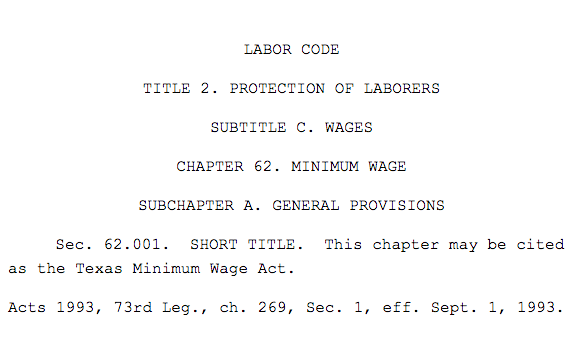This blog was written by Economic Opportunity Intern Anna Crockett and Economic Opportunity Director Chandra Villanueva.
Texas has one of the highest poverty rates in the country, despite having some of the country’s hardest workers. Though our state is a national leader in job creation, too many Texas jobs don’t pay enough to support a family. The Texas Family Budgets Calculator shows what this looks like around the state.
Recognizing that the federal minimum wage falls short of what families need to make ends meet, other states and cities across the country have raised their minimum wages above the federal level of $7.25 an hour. No Texas cities have done this because Texas state law currently stops cities and counties from making most local decisions about the minimum wage. Local governments are only able to raise minimum wages for their own government employees and contract workers. What cities can do, however, is to insure that other benefits like paid sick time are available to all workers in that city which is what the City of Austin has done.
But how did we get here on the dollar minimum wage?
What is the Texas Minimum Wage Act?
Originally passed by the Texas Legislature in 1993, the Texas Minimum Wage Act stipulates that all employers must pay their employees at least the federal minimum wage. In 2003, the Legislature added a provision stating that local entities may not enact a law that requires private employers to pay their employees more than the federal minimum wage. Of course, private employers may still voluntarily pay their employees more than the minimum wage. Local governments are also able to set a higher minimum wage for public and contract workers.
How is “wage” defined?
The Texas Minimum Wage Act mentions three different benefits that employers can include when calculating an employee’s wage—food and lodging provided by the employer, and tips. These three benefits constitute payment under the law; however, other forms of compensation, including paid sick time, are not covered. The law also exempts certain types of workers – such as inmates and babysitters – who can therefore legally be paid less than the minimum wage.
What’s next for wages in Texas?
The Texas Minimum Wage Law is clear in its language—no private employer can be compelled to pay its employees more than the federal minimum wage. Tips, employer-provided food and housing, and of course, monetary compensation, are explicitly stated as the four elements that make up an employee’s wage. Other forms of compensation, including paid sick leave, are not considered part of a worker’s wage.
The federal minimum wage has not increased since 2009 and falls far short of what families need to make ends meet and join the middle class. Yet, Texas continues to deny city residents and their local elected officials the ability to adjust wages locally. CPPP analysis has shown that raising the minimum wage across Texas to $10.10 would provide a pay increase for 2.4 million workers—of those 60 percent are in their prime working years (between 25 and 54 years old).
To improve conditions for working families, Texas should repeal the prohibition on local minimum wage policies and embrace other worker supports such as paid sick days so that workers don’t have to choose between working and caring for a sick family member.
To find out what it takes to get by in your community try our Texas Family Budgets Calculator
Read more from CPPP on why Texas should let local communities raise the minimum wage.
